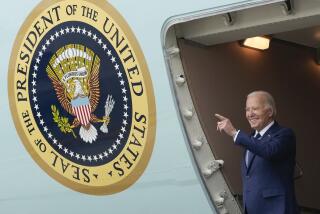Electing 2nd Best
- Share via
I have read Page Smith’s “We’re Upholding Tradition in Electing Second Best” (Jan. 13) with interest and some reservations.
Smith chastises the American people because, in electing the President, they prefer a second-rate man to one of “intelligence, experience and contributions to the nation.” He gives a few examples: They preferred William Henry Harrison to Daniel Webster, James K. Polk to Henry Clay.
The reason behind this castigation is Smith’s specific view of history. For him people should vote not by preference (likes or dislikes) but by knowledge. As one might say, choose a wife according to knowledge and flee from inclination or preferences.
We well know that in choosing a wife, the intelligence or experience of a person has only a limited appeal. What more often exerts the greater influence is needs and feelings. The same can be said in the case of a presidential election.
People choose a President not for his intelligence or experience but because he satisfies their preferences, needs, desires, interests or even illusions.
Smith is an excellent historian but here he overlooks an important element. He implies that people are (creatures of) reason only, and that, therefore, they should vote according to knowledge (intelligence, etc.), whereas man is a mixture of reason and emotions. It goes without saying that emotion or need or interest often prevails over reason.
ANGELO A. DE GENNARO Loyola Marymount University Los Angeles Demagogic inaccuracy by professional thinkers who clearly know better, such as that recently exhibited by Page Smith, inspires more sorrow than anger. But it also requires response.
Smith’s intention is clear: By disparaging the American people’s ability to elect the “best qualified” candidates, he hopes to console his “liberal friends” in their bitterness at President Reagan’s reelection. Smith is doing his friends no favor by encouraging them to question voters’ intelligence rather than to learn from the experience; but that is not his major problem.
Throughout his article, Smith uses “best qualified” so inconsistently that it ends up meaning nothing. So, for example, Smith asserts that Lincoln was “the least qualified” of the candidates in 1860 based essentially on the comparative political resumes of the four candidates.
But Smith also claims that George S. McGovern in 1972 was “infinitely preferable” to Richard M. Nixon, despite the fact that Nixon’s political resume (incumbent President, two-term vice president, congressman and senator from California) was clearly stronger than McGovern’s (congressman and senator from South Dakota).
Political qualifications, however, have to do with much more than the jobs candidates have held--especially in the highest offices. They involve issues, strength of character, shrewdness in campaigning, the weaknesses of opponents, the kinds of prominent supporters the candidate attracts and many other matters. By these standards, the voters’ choice of Lincoln over Douglas and, yes, of Nixon over McGovern can easily be justified.
Finally, Smith’s article is based on the implicit premise that candidate Reagan was less qualified than candidate Mondale--a highly debatable position for which Smith presents no proof at all.
GEORGE COLVIN Riverside


